Movie Review – Downfall (aka Der Untergang)
Stunning film, terrifying and moving in almost every way, Bruno Ganz manages to do something most actors are unable (or unwilling) to do: humanize Hitler and almost – almost – make him a sympathetic character. Brilliantly acted by the entire cast, and filmed to perfection by Oliver Hieschbiegel, Downfall is a superb achievement in cinema, and essential viewing for anybody.
– Summary –
Director : Oliver Hirschbiegel
Year Of Release : 2004
Principal Cast : Bruno Ganz, Alexandra Maria Lara, Corrina Harfouch, Ulrich Matthes, Juliane Köhler, Thomas Kretschmann, Heino Ferch, Ulrich Noethen.
Awards : Nominated for an Academy Award For Best Foreign Language Film.
Approx Running Time : 155 Minutes (Theatrical Version)
Synopsis: Tracking the movements of Hitler’s final days in the Fuhrerbunker, the massive underground complex below Berlin, during the final days of the Nazi war in Europe.
What we think : Stunning film, terrifying and moving in almost every way, Bruno Ganz manages to do something most actors are unable (or unwilling) to do: humanize Hitler and almost – almost – make him a sympathetic character. Brilliantly acted by the entire cast, and filmed to perfection by Oliver Hieschbiegel, Downfall is a superb achievement in cinema, and essential viewing for anybody.
**********************
Ask anybody on Earth, particularly those in English speaking countries, who they’d have on a list of the most hated figures in history, and it’s a fair bet that almost all would have Adolf Hitler in their top three. Hitler, former German Chancellor and leader of the infamous Nazi Party, led Germany to war against the rest of Europe during the 40’s. Those of you who don’t know much about Hitler would be well advised to read up on him prior to watching this film, and those who do will probably have a fair idea of the events surrounding the evil dictator’s death – that he and his wife Eva Bruan killed themselves in the Bunker on April 4th, 1945, and that Germany surrendered soon afterwards to the Allied forces. Since the end of the war, any mention of the Nazi Party or those involved with it in Germany has been pretty much taboo in anything other than documentaries on the subject. The German people do not like to remember the Nazi Party or the effect they wrought on Germany both during and after the war, even to this day. While on holiday in Munich back in 2008, my wife and I were asked by our guide not to even think about jokingly raise our hand in the Nazi salute, nor were we to utter the phrase “Heil Hitler”, lest we be arrested. Which is understandable considering that even now, by many, the phrase “German nation” often elicits thoughts of the Swastika marching across Europe. Even the swastika symbol, once used by many different organizations, groups and institutions has forever been corrupted by the images of Nazi jackboots stomping through European cities, the Eagle standard before it: the mere hint of it in any design or logo would now be cause for removal. Which makes the production of Downfall such a startling one indeed. Made with German money, in Germany with full German crew, Downfall represents one of the first serious filmic examinations of one of history’s most despised figures to come out of Germany, albeit nearly 60 years since his death.
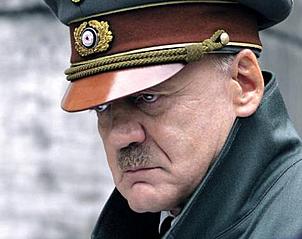
Downfall begins at a time when Berlin is besieged by advancing Russian troops, and Hitler, along with many of his control infrastructure, has retreated to the underground Fuhrerbunker, a claustrophobic and labyrinthine network of rooms and corridors underneath Berlin’s streets, where he could continue to command his forces whilst relatively safe from harm. The Russians, who have all but destroyed any chance the Germans have of routing them out of the capital, are slowly, and inexorably, bearing down upon the Nazi forces and those who command them. Hitler, who is emotionally unraveling the closer he gets to capture, is under increasing pressure from his military advisers to give up, although there is division in the ranks about this; some of the military men want a “last man standing” action, whereby their troops are ordered to fight until all ammunition is exhausted, before committing suicide, lest they be captured by the Russians. With many families of Nazi Party members also in the Bunker, the situation becomes more and more precarious the closer the Russian advance gets. Eventually, Hitler, along with his wife, kill themselves in fear of what the Allies will do to them – and several other Nazi Party members follow suit in due course.
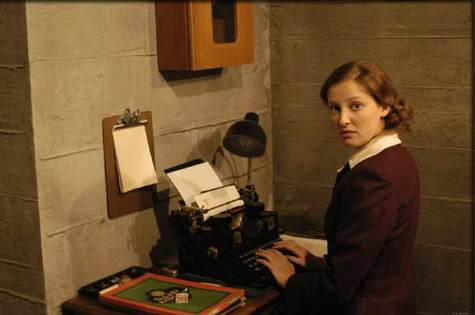
In the decades since his demise at his own hand, the portrayal of Hitler on screen has been littered with all manner of cliched, propagandist performances, ranging anywhere from the silent, malevolent type (Indiana Jones & The Last Crusade) to the wild-haired, manic, apoplectic Napoleon-clone of Tarantino’s Inglourious Basterds, to name only two examples. Often the butt of jokes (Adam Sandler hitting the mark best in Little Nicky) and often with the affected caricature of his known attributes, cinema has never been kind to the famous dictator (although, now that I think of it, German cinema during Hitler’s reign was actually overtly complementary, thanks for films like Triumph Of The Will and its ilk), and it’s taken a German filmmaker to finally give us a portrayal of Hitler that isn’t (or doesn’t seem to be) mired in historical fiction. Director Oliver Hirschbiegel has managed to do something hitherto impossible for a dramatization of real events: he’s given the Nazis, and Hitler in particular, a humanity, a sadness and an empathy that contravenes our thoughts and preconceptions of them.
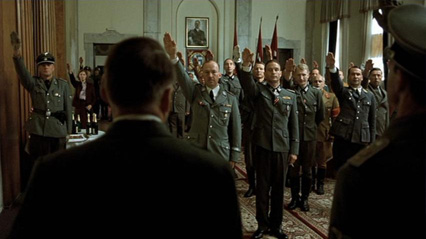
The reason this film resonates so deeply with me, I think, is due to the fascinating pseudo-documentary feel to the events portrayed: Downfall is a birds-eye view into the last days of the Third Reich, told ostensibly through the point of view of young German woman Traudl Junge (Alexandra Maria Lara), who was one of Hitler’s personal secretaries between 2942 and the end of the war. The film begins with the real life Junge recounting her time in the Bunker, before changing to the “dramatized” version. By using this narrative style, Hirschbiegel is able to portray the effects of the war, of the Nazi regime, in a way that is infinitely more personal than a simple, linear story arc. Junge anchors the film, even though she’s not the central character as such – a participant, surely, but a fairly benign one at that. A secondary character, Ernst Günther-Schenck (Christian Berkel), who was a doctor and Colonel caught up in the rout of German forces in Berlin, gives us a viewpoint outside the Bunker, a valuable story arc that gives the film a broader canvas than just inside the catacombs. These two storylines converge and diverge throughout Downfall, and while they may at first seem disparate to a degree, both Junge and Günther-Schenck provide a sort of anti-Nazi commentary for the film; they’re the Good Guy Nazi’s in all this, and while they are essentially caught up in events beyond their control, we can’t forget that they are Nazis.
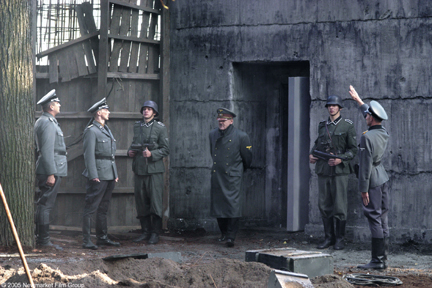
The casting in this film is, in a word, superb. Each and every member of the cast, without exception, are exemplary in their respective roles. Lara and Berkel provide the empathetic humanity of the film, the tint through which we observe the horrific events that transpire through this film. Of note, the casting of Ulrich Matthes as Joseph Goebbels, quite possibly one of the best choices for the role of one of history’s most evil men. Matthes is evil personified, his dark eyes and withering glare perfectly capturing the essence of one of the Nazi Party’s most feared leaders. Goebbel’s wife, Magda, is played with chilling iciness by Corinna Harfouch, in a role which is truly heartbreaking. Heino Ferch does a terrific job as Albert Speer, a German architect who’s seen the writing on the wall for the Nazis, and asks Hitlers permission to leave Berlin prior to Russian victory. The scene between Speer and Hitler on their discussion of Hitler’s proposed “Scorched earth” policy is truly chilling in its menace, although an almost tender Speer seems to feel somewhat sorry for the rapidly disintegrating dictator.
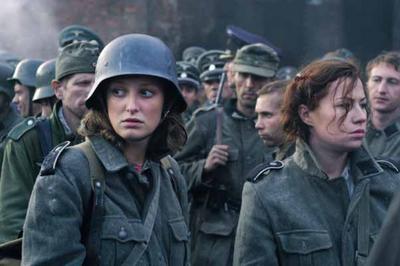
Downfall’s major success, however, is derived from Bruno Ganz’s powerhouse performance as Hitler himself. Nuanced, sublime acting, along with some defining monologues handled with care, make Ganz’ portrayal of Hitler quite possibly one of the best I’ve ever seen, if not the best. It’s easily the most realistic portrayal of the man, a man haunted by his fears, paranoid about his leadership and the aspirations of those around him, and angry that his great Reich is facing imminent destruction. It’s not an easy task to make somebody so reviled feel so human, especially in light of the decades of parody and skewed perception of the man. Indeed, Ganz brings a human side to Hitler, much like a Little Boy Lost, a lost soul looking for absolution against all he’s wrought, and yet completely insane at the same time. At times, Ganz is able to portray Hitler with a level of empathy, making us almost feel sorry for his situation – and to find oneself watching a film about Hitler and thinking “aww, he wasn’t all that bad” is disconcerting to say the least. He was guilty of some of history’s most reprehensible acts: either directly or indirectly, and for an actor to make us feel something other than hatred for him is a stunning performance indeed. As the film progresses, Hitler becomes more and more hunched, a sign of the pressure he was under at the time – it’s a subtle affectation by Ganz, but an effective one. If you have resisted watching Downfall due to its content and storyline, can I advise that you see it if only for Ganz’s mesmerizing performance.
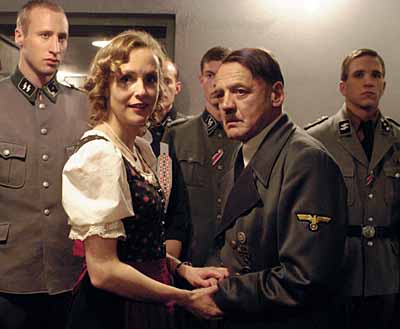
The film manages to avoid a lot of the graphic, in-your-face violence which flows through all modern war-themed films (especially since Saving Private Ryan) by having a lot of the immediate violence take place just off-screen and out of frame. The themes of the film, many of which include suicide and the murder of children, are pretty dark anyway, but the audience is spared the full horror of this material by making is less of an “event” and more of an “outcome”, not seen but definitely heard. The Goebbels’ murder of their children, before their own cowardly suicide, is heartbreaking to watch, made all the more so by one of the young children resisting taking the poison which puts them to sleep. When people are shot, or shoot themselves (there’s a lot of that in this film) it often occurs out of frame, a cinematic device which is actually more acute to an audience because we imagine what’s happening, rather than see it in actuality. Our horror comes from our own imagination. In a sense, I was a little annoyed that Hirschbiegel went down this route, mainly due to the fact that it makes it seem like Downfall is trying to avoid a direct connection with the audience, to blunt the full impact, if you will, by avoiding genuine bloodshed. Hitler and Eva Bruan’s eventual suicide is never seen, only heard, and Hirschbiegel even cuts away from the Goebbel’s act of cowardice for a moment, as if trepidatious of giving these evil people a “heroic” death. On the flip side, the argument could me made for genuine artistic merit: Junge never saw Hitler kill himself, nor did Gunther-Schenck, so I guess it’s fair to say the filmmakers only showed what our main characters witnessed themselves. Whichever the case may be, Downfall is still a powerful film, due mainly to it’s oppressively despondent themes.
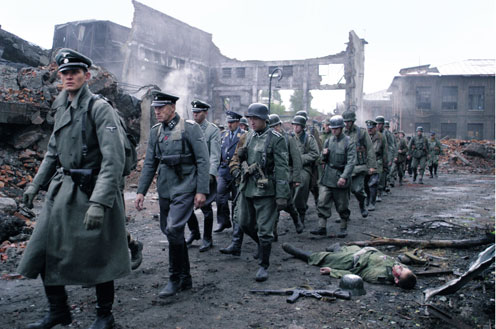
From a production perspective, Downfall looks and sounds stunning. From Stephan Zacharias’s stunningly beautiful score, to Rainer Klausmann’s gorgeous cinematography, as well as the various locations and sets on display, this film sets a new benchmark for dramatic war films. Downfall isn’t ostentatious, nor is it aloof or cold, but it exists somewhere between monochrome documentary and technicolor rainbow in both visual and aural aesthetic. Klausmann makes wonderful use of the stark, oppressive Bunker sets, remaining flat and well lit almost all the time, while the scenes in Berlins streets are shadowy, dirty and gritty: perfect contrast between the underground and the surface. Below ground is clean and tidy, while above is the opposite.
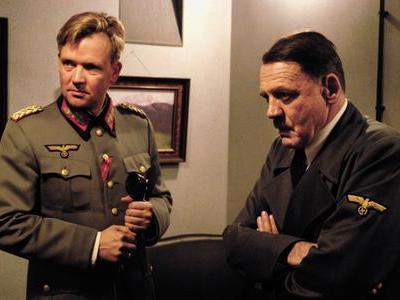
Downfall has been quoted as being one of the best war films ever made, of the same caliber as Saving Private Ryan or Das Boot. I hesitate to say that the reference to Spielberg and Peterson is manifestly inadequate: this is neither a soldier film, nor is it a submarine film, because it does not portray combat as its central theme. What it is, though, is a study in human loss and grief, told from the side of those who instigated one of the most deadly wars in human history. It’s moving, profoundly motivating and altogether chilling in its dry, unwavering portrayal of the actions of those inside the Nazi command during the fall of Berlin – coupled with some astonishingly good performances (and a truly magnificent one from Bruno Ganz), as well as some effective production values, Downfall will stand alongside Das Boot and Saving Private Ryan as an exceptional piece of filmmaking in its own right. There are no heroes here, no chest beating braggadocio. Some viewers will feel a wave of justified hatred towards the films’ subjects, and make no mistake, that’s quite okay, but the most amazing thing about Downfall is its ability to make us feel something for these people, often portrayed as some of history’s most reviled human beings. What you draw from that, is entirely up to you.


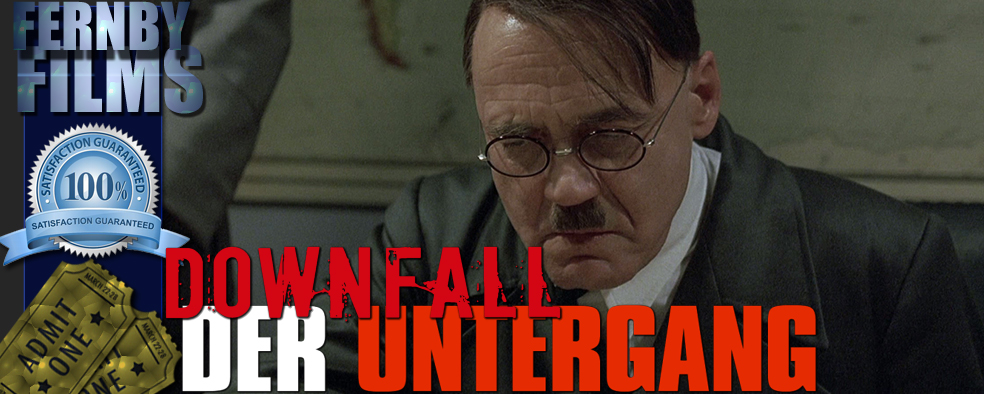
 Der Untergang | Downfall (2004)
Der Untergang | Downfall (2004)


this is the movie I have searching since 2005.that time i watched it on action TV but couldn’t find its name.
Well, now you know, don't you Karim.
Excellent review Rodney…I echo your glowingly positive response to the film. I think Ganz's performance as Hitler is astonishing – very powerful.
Thanks Dan! Agreed.
Excellent review of a phenomenal film! Bruno Ganz gives what might be the best performance in ANY LANGUAGE of the last decade.
By the way, thanks heaps for the awesome image in your sidebar that links to my blog!
You're very welcome Tom. Thanks for dropping in and checking out our stuff!